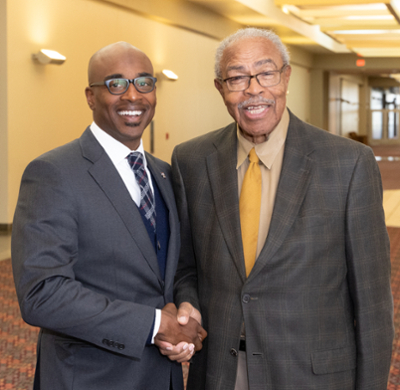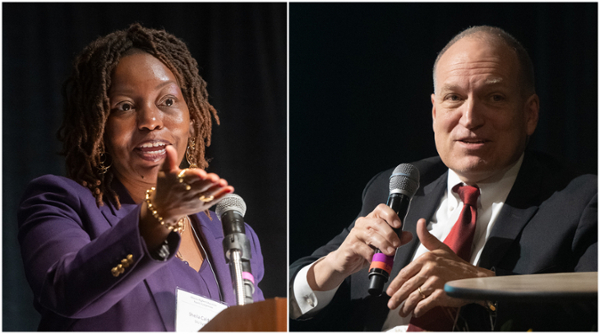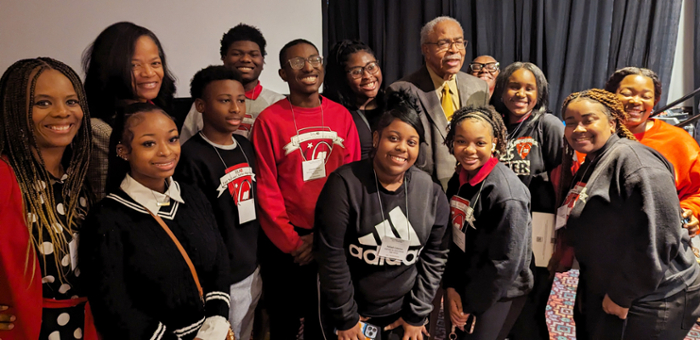Rev. Wheeler Parker Jr. Gives Eyewitness Account of Emmett Till’s Abduction During SIU’s Equity Symposium
 He was there that horrific night when Emmett Till was kidnapped, resulting in a brutal murder. The Rev. Wheeler Parker, Jr. was the keynote speaker during the second annual Illinois Higher Education Equity Symposium entitled, “Reclaiming Our Stories: Reimagining Student Success,” presented by the Southern Illinois University (SIU) System.
He was there that horrific night when Emmett Till was kidnapped, resulting in a brutal murder. The Rev. Wheeler Parker, Jr. was the keynote speaker during the second annual Illinois Higher Education Equity Symposium entitled, “Reclaiming Our Stories: Reimagining Student Success,” presented by the Southern Illinois University (SIU) System. Southern Illinois University Edwardsville Chancellor James T. Minor, PhD, welcomed the audience, that included students from the SIUE East St. Louis Charter High School’s (CHS) Student Council, to the symposium on Thursday, Oct. 19 at the Gateway Convention Center in Collinsville. SIU System President Dan Mahony followed Minor with a State of Education address.
A number of diverse speakers shared personal stories of encounters with inequity from the classroom and college admission to incidents of injustice and inhumanity. Presenters illustrated an American history of Black subjugation and suppression, and worldwide oppression including apartheid in South Africa and the horrors of the Holocaust.
“My story is not a pleasant story. It’s not a pretty story, but it is an American story,” said the 84-year-old Parker, author of “A Few Days Full of Trouble: Revelations on the Journey to Justice for My Cousin and Best Friend, Emmett Till.” “We live in a country that’s a melting pot. We have Italians, Irish, Spanish, Africans. So why can’t we do what Rodney King asked? Why can’t we all get along?”
 “When you have lived as long as I have and have experienced the things that I have, you have to decide how you want to live your life,” continued Parker. “I’m not here to stir up animosity, ill will or hate. But we must be honest with ourselves. Don’t lie to yourself, and don’t lie about history.”
“When you have lived as long as I have and have experienced the things that I have, you have to decide how you want to live your life,” continued Parker. “I’m not here to stir up animosity, ill will or hate. But we must be honest with ourselves. Don’t lie to yourself, and don’t lie about history.” Parker recounted the infamous story of his cousin and best friend, Emmett Till. Parker was 16 years old when he and a 14-year-old Till traveled from Chicago to the Mississippi Delta in August of 1955. Till was a fun-loving, jokester with a bad stutter who had the nickname of Bo-Bo.
One Sunday, Till went into a small grocery store where he encountered a 21-year-old white woman named Carolyn Bryant.
 “There have been a lot of stories and lies about what happened in that store,” said Parker. “I was there. It didn’t happen that way. Carolyn Bryant came out of the store and Bo-Bo gave her a wolf whistle.”
“There have been a lot of stories and lies about what happened in that store,” said Parker. “I was there. It didn’t happen that way. Carolyn Bryant came out of the store and Bo-Bo gave her a wolf whistle.” According to Parker, Till did it to get a laugh and did not realize what would happen, because he did not know the Jim Crow-era South, according to Parker. A few days later, in the early hours of the morning, two armed white men barged into the family home and drug away Till. The men savagely beat and mutilated the 14-year-old. His body was found three days later in the Tallahatchie River.
Till’s mother, Mamie Till-Mobley, held an open casket funeral to show the world the brutality her son endured. Till’s lynching became one of the cornerstones of the Civil Rights movement in the U.S., exposing American racism around the world. Till’s story was the subject of musician and Nobel Laureate Bob Dylan’s song “The Ballad of Emmett Till.”
“You can’t let bitterness and racism control you,” said Parker, pastor and district superintendent of the Argo Church of God in Christ in Summit. “How do you handle your problems? You can’t hold onto hatred. Don’t let anything destroy you.”
“His presentation was informative and inspirational,” said CHS junior Orlando Evans. “He taught forgiveness and how to do it, and how to handle difficult situations. Today, everyone is so quick to become angry instead of going about it in a better way.”
“His speech confirmed a lot of truth that I have heard about concerning our history,” said CHS junior Angeleah McGee. “His speech put in perspective how bad it truly was. But I am happy he was able to come and speak about it, although some pain still lingers. I’m happy he’s able to keep going without hatred and resentment.”
The two-day symposium began with an introduction from conference organizer Sheila Caldwell, EdD, vice president for anti-racism, diversity, equity and inclusion (AEDI) for the SIU System.
“At this time, anti-racism, diversity, equity and inclusion are under siege,” said Caldwell. “Thirty-four states across the nation have introduced or passed legislation to restrain the teaching of anti-racism, diversity, equity and inclusion. Now, more than ever, we need to be vigilant and purposeful in our efforts to counteract these challenges.”
In a private conversation between Minor and Parker, Minor asked if Parker felt a connection between Till’s murder sparking a movement at that time and the George Floyd moment of our time. Parker said, “It’s the same spirit. Laws make you behave differently. The laws don’t legislate the heart.”
Parker continued, “The same spirit that killed Emmett Till, killed George Floyd. Only to me, there was more diversity protesting. I said, God you’re awesome.”
More of their conversation will be aired at a later date on the WSIE 88.7 program “On Another Note” with Robin Boyce.
In Minor’s welcome to conference attendees, he began with his remarks citing the history for the need of higher education in the Metro East, and the history of the first courses of SIUE in East St. Louis and Alton in 1957.
“Pursuing higher education is a remarkable experiment and opportunity for young people,” said Minor. “We know the promise of higher education attainment is important to improve the economic, civic and democratic vitality of our communities. I continue to have these questions about higher education. Who’s excluded? Who graduates? Who has access? These questions are as relevant today as they were in 1957.”
“But here’s what inspires me,” Minor continued. “On my drive here this morning, I thought that never in the history of higher education have we had a composition of leaders who care about equity and are in a position to actually do something about it.”
In his State of Education address, Mahony offered six key trends in higher education: increasing fiscal challenges, changing student demographics, the impact of the Supreme Court decision on affirmative action, the anti-ADEI movement across the country, and changing perspectives of students and opportunities for positive action.
“I love this generation of students. There is an increasing percentage of students who are supportive of efforts related to anti-racism, diversity, equity and inclusion,” noted Mahony.
“It’s extremely personal to them and their friends. It reminds me of one of my favorite James Baldwin quotes that says, ‘We can disagree and still love each other unless your disagreement is rooted in my oppression and denial of my humanity and right to exist.’”
The SIU System president encouraged the audience about the AEDI opportunities that exist in Illinois. “We have a governor who supports our efforts. We can do things that other places may not be able to,” he continued. “I also believe what Dr. Martin Luther King, Jr. said, ‘The arc of the moral universe is long, but it bends toward justice.’ I think eventually we will see institutions start to move back in a different direction.”
“If we create models here that support our student success, other people can follow them in the future,” said Mahony. “It’s the right thing to do, and frankly, it’s the smart thing to do.”
Other opening day speakers and presenters included: Camille Davidson, dean and professor of SIUC School of Law; Wendi El-Amin, MD, associate dean for equity, diversity and inclusion for the SIU School of Medicine; Ted Williams III, educator, author, actor; Rep. Carol Ammons, D-Urbana; Edward Mienie, PhD, executive director for Strategic Studies and Partnerships, professor of Strategic and Security Studies at the University of North Georgia; Ron Coppel, docent of the Illinois Holocaust Museum and Education Center in Schaumburg; and Greg Bush, owner, president and CEO of the technology firm, Kristine Fallon Associates, Inc. (KFA). The SIUE Gospel Choir performed a stirring selection of “Total Praise” by Richard Smallwood.
The final day of the Illinois Higher Education Symposium opened with a keynote address: “Increasing Equity and Retention Rates at SIUE,” presented by Jessica Harris, PhD, vice chancellor for anti-racism, diversity, equity and inclusion; Earleen Patterson, PhD, associate vice chancellor for student opportunities, equity, diversity and inclusion; and Nicole Dixon teaching assistant in the CAS Department of English Language and Literature.
“The Illinois Higher Education Symposium curated spaces for participants to gain new insights to reimagine student success by learning from peers, legal experts, education scholars, and legislators who shared their knowledge and experiences on equity in higher education,” said Caldwell. “In addition to America, participants heard stories from Germany and South Africa with the aim to learn about structural changes that have advanced equity in education and society.”
The Southern Illinois University System enriches students and diverse communities through inclusive excellence, experiential education and innovation. The system creates and shares knowledge that enables stakeholders to achieve their full potential, serves as an economic catalyst for the region and state, and advances global change, opportunities and social justice. Over the course of the last 150 years, the SIU campuses have grown from humble beginnings to be recognized as ever-expanding centers for learning and research. During that time, SIU Carbondale and SIU Edwardsville have developed into the core of a modern university system that provides learning opportunities to over 27,000 students.
PHOTOS:
(L-R): SIUE Chancellor James T. Minor, PhD, welcomes the Rev. Wheeler Parker Jr. to the IHEE symposium on Thursday, Oct. 19.
(L-R): Symposium organizer Sheila Caldwell, EdD, vice president for anti-racism, diversity, equity and inclusion (AEDI) for the SIU System opens the conference. SIU System President Dan Mahony gives a State of Education address.
SIUE Charter High School students, staff and administrators, greet Parker after his Oct. 19 keynote address.










